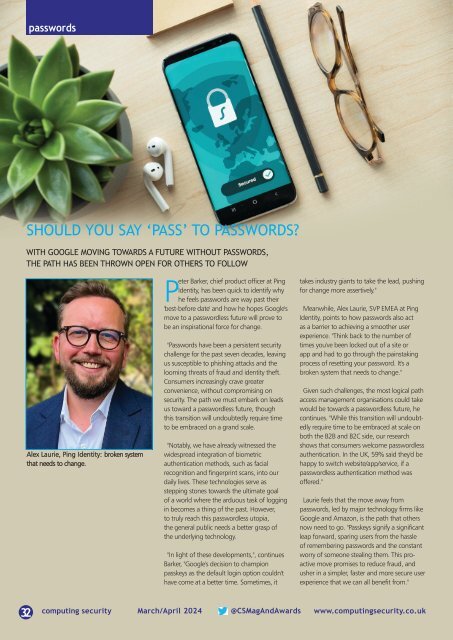CS Mar-Apr 2024
Create successful ePaper yourself
Turn your PDF publications into a flip-book with our unique Google optimized e-Paper software.
passwords<br />
SHOULD YOU SAY ‘PASS’ TO PASSWORDS?<br />
WITH GOOGLE MOVING TOWARDS A FUTURE WITHOUT PASSWORDS,<br />
THE PATH HAS BEEN THROWN OPEN FOR OTHERS TO FOLLOW<br />
Alex Laurie, Ping Identity: broken system<br />
that needs to change.<br />
Peter Barker, chief product officer at Ping<br />
Identity, has been quick to identify why<br />
he feels passwords are way past their<br />
'best-before date' and how he hopes Google's<br />
move to a passwordless future will prove to<br />
be an inspirational force for change.<br />
"Passwords have been a persistent security<br />
challenge for the past seven decades, leaving<br />
us susceptible to phishing attacks and the<br />
looming threats of fraud and identity theft.<br />
Consumers increasingly crave greater<br />
convenience, without compromising on<br />
security. The path we must embark on leads<br />
us toward a passwordless future, though<br />
this transition will undoubtedly require time<br />
to be embraced on a grand scale.<br />
"Notably, we have already witnessed the<br />
widespread integration of biometric<br />
authentication methods, such as facial<br />
recognition and fingerprint scans, into our<br />
daily lives. These technologies serve as<br />
stepping stones towards the ultimate goal<br />
of a world where the arduous task of logging<br />
in becomes a thing of the past. However,<br />
to truly reach this passwordless utopia,<br />
the general public needs a better grasp of<br />
the underlying technology.<br />
"In light of these developments,", continues<br />
Barker, "Google's decision to champion<br />
passkeys as the default login option couldn't<br />
have come at a better time. Sometimes, it<br />
takes industry giants to take the lead, pushing<br />
for change more assertively."<br />
Meanwhile, Alex Laurie, SVP EMEA at Ping<br />
Identity, points to how passwords also act<br />
as a barrier to achieving a smoother user<br />
experience. "Think back to the number of<br />
times you've been locked out of a site or<br />
app and had to go through the painstaking<br />
process of resetting your password. It's a<br />
broken system that needs to change."<br />
Given such challenges, the most logical path<br />
access management organisations could take<br />
would be towards a passwordless future, he<br />
continues. "While this transition will undoubtedly<br />
require time to be embraced at scale on<br />
both the B2B and B2C side, our research<br />
shows that consumers welcome passwordless<br />
authentication. In the UK, 59% said they'd be<br />
happy to switch website/app/service, if a<br />
passwordless authentication method was<br />
offered."<br />
Laurie feels that the move away from<br />
passwords, led by major technology firms like<br />
Google and Amazon, is the path that others<br />
now need to go. "Passkeys signify a significant<br />
leap forward, sparing users from the hassle<br />
of remembering passwords and the constant<br />
worry of someone stealing them. This proactive<br />
move promises to reduce fraud, and<br />
usher in a simpler, faster and more secure user<br />
experience that we can all benefit from."<br />
32<br />
computing security <strong>Mar</strong>ch/<strong>Apr</strong>il <strong>2024</strong> @<strong>CS</strong>MagAndAwards www.computingsecurity.co.uk
















